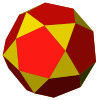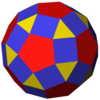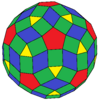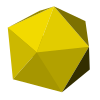Expanded icosidodecahedron
Appearance
(Redirected from Expanded rhombic triacontahedron)
| Expanded icosidodecahedron | |
|---|---|

| |
| Schläfli symbol | rr = rrr{5,3} |
| Conway notation | edaD = aaaD |
| Faces | 122: 20 {3} 60 {4} 12 {5} 30 rhombs |
| Edges | 240 |
| Vertices | 120 |
| Symmetry group | Ih, [5,3], (*532) order 120 |
| Rotation group | I, [5,3]+, (532), order 60 |
| Dual polyhedron | Deltoidal hecatonicosahedron |
| Properties | convex |
 Net | |
The expanded icosidodecahedron is a polyhedron, constructed as an expanded icosidodecahedron. It has 122 faces: 20 triangles, 60 squares, 12 pentagons, and 30 rhombs. The 120 vertices exist at two sets of 60, with a slightly different distance from its center.
It can also be constructed as a rectified rhombicosidodecahedron.
Other names
[edit]- Expanded rhombic triacontahedron
- Rectified rhombicosidodecahedron
- Rectified small rhombicosidodecahedron
- Rhombirhombicosidodecahedron
Expansion
[edit]The expansion operation from the rhombic triacontahedron can be seen in this animation:
Dissection
[edit]This polyhedron can be dissected into a central rhombic triacontahedron surrounded by: 30 rhombic prisms, 20 tetrahedra, 12 pentagonal pyramids, 60 triangular prisms.
If the central rhombic triacontahedron and the 30 rhombic prisms are removed, you can create a toroidal polyhedron with all regular polygon faces.
Related polyhedra
[edit]| Name | Dodeca- hedron |
Icosidodeca- hedron |
Rhomb- icosidodeca- hedron |
Expanded icosidodeca- hedron |
|---|---|---|---|---|
| Coxeter[1] | D | ID | rID | rrID |
| Conway | aD | aaD = eD | aaaD = eaD | |
| Image | 
|

|

|

|
| Conway | dD = I | daD = jD | deD = oD | deaD = oaD |
| Dual | 
|

|

|

|
See also
[edit]- Rhombicosidodecahedron (expanded dodecahedron)
- Truncated rhombicosidodecahedron
- Expanded cuboctahedron
References
[edit]- Coxeter Regular Polytopes, Third edition, (1973), Dover edition, ISBN 0-486-61480-8 (pp. 145–154 Chapter 8: Truncation)
- John H. Conway, Heidi Burgiel, Chaim Goodman-Strauss, The Symmetries of Things 2008, ISBN 978-1-56881-220-5
External links
[edit]- George Hart's Conway interpreter: generates polyhedra in VRML, taking Conway notation as input, [1] VRML model
- Convex Polyhedra containing Golden Rhombi: 2. Expanded RTC ('XRTC') and related polyhedral
- Variations on a Rhombic Theme


